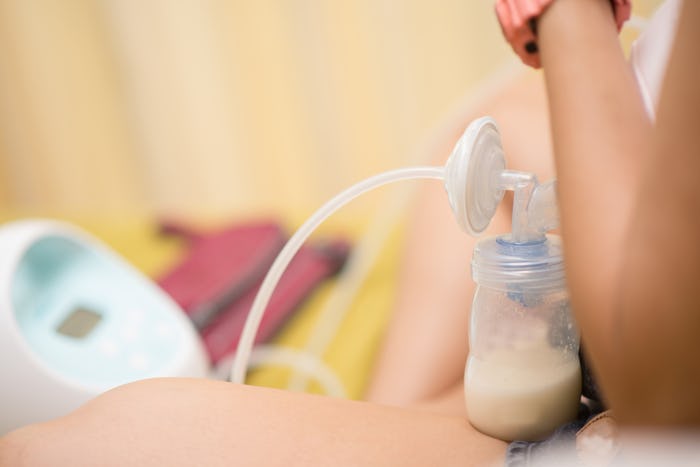Life

Breast Milk Often Changes How It Looks, But Here's How That Liquid Gold Should Smell
Being a nursing mom is hard. There are so many things you have to worry about. Am I producing enough milk? Am I eating healthy enough for my baby? Am I covered up, or is my boob out for the world to see? I'm not even joking — one time I almost answered my front door with an exposed boob without even realizing I hadn't buttoned my shirt. Awkward. When you're nursing 24/7, they're just always out, you know? And to add to the weird stuff, how is breast milk supposed to smell? How do you know if yours has gone bad? I did some research and spoke to an expert on the subject to answer these questions.
I reached out to Angie Natero, an International Board Certified Lactation Consultant (IBCLC) and nurse who tells Romper in an email that "breast milk should have a slight sweet smell, or often not much smell at all". During my research, I noticed a lot of moms on the breastfeeding forums were asking about a soapy odor to their breast milk. Natero addresses this and says that the soapy odor smell doesn't necessarily mean the milk is spoiled, but usually means there is an "excess of the enzyme lipase. High lipase isn’t harmful to [the] baby, but some babies will reject this milk due to the different taste while some babies accept it without any issue at all". If you're experiencing this issue with your breast milk, not to worry. She continues on to explain that this issue is common among breastfeeding moms and can be remedied quite easily. She recommends consulting with a lactation specialist — just hang in there.
But how do you know if your milk has spoiled? Natero says that your milk will be good to go at room temperature for three to four hours. But if it has gone bad, it will be very obvious as "it will have a rancid foul odor and taste, much like any other rotten drink or food." If this happens, you will want to discard it and make sure you properly clean and sanitize the bottle or storage container. If you're a mom who is pumping and storing, you can store freshly expressed breast milk in the refrigerator for three to four days, and after that, you can store in the freezer for up to six months. Angie explains that these timelines apply generally to healthy, full-term infants and not to preterm babies, so if you have specific concerns, please reach out to your pediatrician and a good IBCLC.
According to the Centers for Disease Control and Prevention (CDC), mothers should temporarily stop nursing if they have certain viruses, are taking certain medications, or are undergoing diagnostic imaging (X-rays, etc.) For more information on breastfeeding contradictions, visit the CDC website. The CDC also offers more information about breast milk storage and addresses issues such as traveling, so check out the guidelines for any more questions.
Nursing your brand new baby is one of the most rewarding experiences you will enjoy while being a new mom — it provides healthy nourishment for baby while creating a strong bond between mom and infant. I used to love the comfort and calm that came along with nursing — until my son began lifting up the nursing cover in public. Peek-a-boo. Remember, if you're choosing to store your milk, as long as you stick to the storage guidelines, your milk will be safe and nourishing for your baby. And as far as smell, everyone is different. As long as your baby accepts the taste and it doesn't have an obviously spoiled smell, you should be good to go.